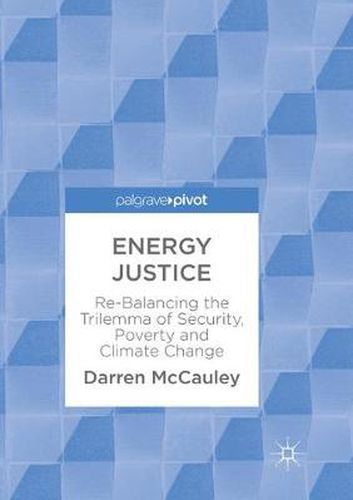Readings Newsletter
Become a Readings Member to make your shopping experience even easier.
Sign in or sign up for free!
You’re not far away from qualifying for FREE standard shipping within Australia
You’ve qualified for FREE standard shipping within Australia
The cart is loading…






This book re-conceptualizes energy justice as a unifying agenda for scholars and practitioners working on the issues faced in the trilemna of energy security, poverty and climate change. McCauley argues that justice should be central to the rebalancing of the global energy system and also provides an assessment of the key injustices in our global energy systems of production and consumption.
Energy Justice develops a new innovative analytical framework underpinned by principles of justice designed for investigating unfairness and inequalities in energy availability, accessibility and sustainability. It applies this framework to fossil fuel and alternative low carbon energy systems with reference to multiple case studies throughout the world. McCauley also presents an energy justice roadmap that inspires new solutions to the energy trilemna. This includes how we redistribute the benefits and burdens of energy developments, how to engage the new energy ‘prosumer’ and how to recognise the unrepresented.
This book will appeal to academics and students interested in issues of security and justice within global energy decision-making.
$9.00 standard shipping within Australia
FREE standard shipping within Australia for orders over $100.00
Express & International shipping calculated at checkout
This book re-conceptualizes energy justice as a unifying agenda for scholars and practitioners working on the issues faced in the trilemna of energy security, poverty and climate change. McCauley argues that justice should be central to the rebalancing of the global energy system and also provides an assessment of the key injustices in our global energy systems of production and consumption.
Energy Justice develops a new innovative analytical framework underpinned by principles of justice designed for investigating unfairness and inequalities in energy availability, accessibility and sustainability. It applies this framework to fossil fuel and alternative low carbon energy systems with reference to multiple case studies throughout the world. McCauley also presents an energy justice roadmap that inspires new solutions to the energy trilemna. This includes how we redistribute the benefits and burdens of energy developments, how to engage the new energy ‘prosumer’ and how to recognise the unrepresented.
This book will appeal to academics and students interested in issues of security and justice within global energy decision-making.